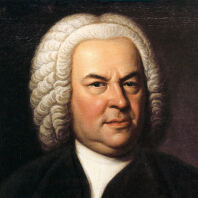Johann Sebastian Bach
Composer
“He should not be called Bach (stream), but Meer (sea), because of his infinite, inexhaustible wealth of tone combinations and harmonies,” Ludwig van Beethoven is reported to have said about Johann Sebastian Bach. The work of the great Baroque master, who came from a musical dynasty stretching over many branches of his family tree, and who left behind an immensely diverse oeuvre, continues to inspire today.
Johann Sebastian Bach was born in Eisenach on 21 March 1685, the youngest of eight siblings. After the death of both parents, he was taken in by his eldest brother Johann Christoph Bach, who had been organist at the Michaeliskirche in Ohrdruf, about 15 kilometres away, since 1690. At the age of 15, he left Thuringia to become a choir student at the church of St Michaelis in Lüneburg “because of his uncommonly beautiful soprano voice”. After Bach took part in the commissioning and inauguration of a new organ in Arnstadt in Thuringia in July 1703, the young musician was appointed organist of the church. From there he travelled to Lübeck – with the declared aim of “understanding one or two things about Buxtehude’s art”. Bach stayed in Arnstadt for four years, and after a brief interlude as organist in Mühlhausen, he entered the service of the Duke of Weimar. Bach was appointed Hofkapellmeister to Prince Leopold of Anhalt-Köthen, after which concertos, orchestral, chamber and piano music became the focus of his creative work. In 1723, as Thomaskantor, he finally took on the highest musical office that the flourishing university and trade fair city of Leipzig had to offer and which was one of the most prestigious in all of Germany.